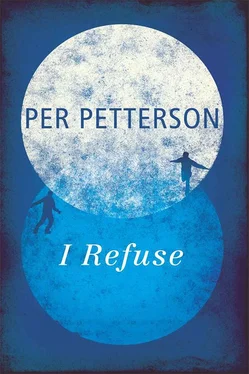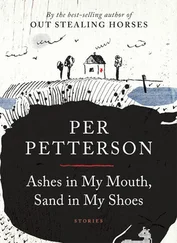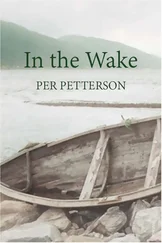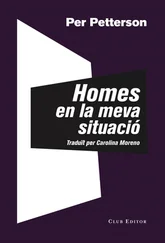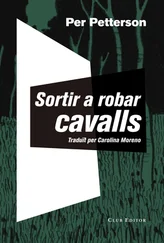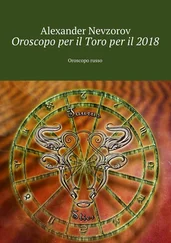I stubbed out the cigarette in the ashtray and stood up and walked to the hall and found a blanket in the closet and walked back and lay down on the sofa. My eyes were so sore. My eyelids would barely open and close, and the skin on my face chafed stiff and dry like a mask against my cheekbones. I was sure I wouldn’t sleep. But I did, and when I woke up she was gone. I tried to remember her name, but it was gone with her.
TOMMY, TOMMY! HURRY, Tommy!
It was Tya calling, it was my mother, I could hear her so clearly, I remember that I did, but today I cannot remember what it was that made her voice hers, what made it different from others. It faded a long time ago.
I, Tommy Berggren, remember how cold it was that day, below freezing point, and I turned ten the day she called me. Tommy, Tommy! Hurry, Tommy! she called, and I ran down the flagstone path to the postbox and on to the road where I saw the stiff sheets hanging on the washing lines like stretched canvases in front of every house and they were just as stiff when the women took them down, they stood out like flags in the wind, like white flags, I surrender, they said.
I ran for all I was worth when I heard her calling me, Tommy! Tommy! she shouted, but I couldn’t see her, couldn’t hear where her voice was coming from. I ran in circles, round and round staring up the road, staring down, but there was no one out there on the road, and I ran down the path between our house and the next and further across the field, after the dip, and we used to play in the dip, Jim and I, because they couldn’t see us from the windows. And there she was, I could see my mother by the low ridges, in her grey cape between the birches, in her warm coat in Birch Woods, we all called it, and the crooked pine was the tallest and was split from the top right down to the middle and from there it grew up again like two completely different trees and the one didn’t know what the other was doing. Lightning had struck the pine tree exactly on the night that I was born, someone had said, perhaps my father said, but I didn’t believe it, lightning striking, on the day I was born, come on, there were no thunderstorms at that time of year, and later in the day Jim was supposed to come, he was coming after dinner, to have cake.
Behind Birch Woods the field went up to the ridge, and I ran as fast as I could, and our school was on the other side of the ridge, in Mørk, and we went there in the school bus every morning, every single day except Sunday. There had been a farm by Birch Woods called Bjørkerud, but now it was gone, along with the barn and hen houses and all the things you were supposed to find on a farm, like the tractor was gone and the plough behind the barn and the horse’s harness from the stable wall and the dog’s leash and the storehouse on pillars was gone and had been for all my living days, not a stone left standing. There was a pond there too, that had belonged to the farm, and there were ducks in the pond, or so my father said, he even said they had a house built on stilts in the water, a little house, the ducks’ house that is, when the farm was a farm. And what was more, the people who lived on the farm used the greenish water in the pond as their drinking water, my father said, and it sounded so sickening with the ducks swimming around in the green water doing all kinds of things in it, that anyone could drink that water.
And that’s what I was thinking about as I raced away, that someone had drunk that devilish green water. I could see it before me as I ran, I could see them drinking it, their mouths opening to the glass, and it was from down by the pond that my mother was calling me, Tommy! Tommy! she called, Hurry! Hurry! He’s drowning! And then I pushed myself even harder, and I couldn’t feel my feet touching the ground, but of course they were, my feet, they were touching the ground, I couldn’t fly for God’s sake, but on the path down to the pond they were lost to me, for there was someone drowning and my mother couldn’t swim.
It was a dog. It was Lobo in the water. I saw his dark head, and his grey beard, just sticking up from the pond, and he was stretching his neck for all he was worth. He looked so tired, he was old and his legs were so full of rheumatism that the joints could hardly bend, and every single day he made the trip up to the Slettens’ house on his four stiff legs to get a good sniff at close range and find out if their bitch was on heat. It took him twenty minutes up and twenty minutes down, and the bitch was on heat, she was on heat about twice a year, on the dot, like all bitches of the right age were, but Lobo had trouble mounting her from the rear, and it didn’t look stylish, no, it did not. Besides, he didn’t have it in him, everyone knew that, and no one could be bothered to chase him away, why would they. Let the dog have some fun for God’s sake, Sletten said, his days are numbered.
He had a pistol in the kitchen drawer, my father said. Sletten had.
She couldn’t swim, but Lobo couldn’t either, not with those sticks for legs, and I ran straight past her in her grey coat and threw myself into the pond. A thin sheet of ice had settled on the water overnight and was still there, and I hit it and it cracked around me like flatbread, and the water was cold, cold, cold. I grabbed his collar with one hand and was treading the green water and it wasn’t easy, moving forward with my shoes on, and my clothes, and Lobo’s feet couldn’t touch the bottom of the Bjørkerud pond and neither could mine. It was slippery, and sticky, and I had to drag him as I swam, and a few times I tried to push off with the tips of my toes, like I did when I took my swimming badge, but I couldn’t reach and Lobo couldn’t help me. He tried, but his body was like an anchor, a dead weight I had to pull through the water, and his black coat was short, so he must have been frozen stiff, Lobo, like the rest of him was stiff. I was just a boy then, he was older than me, but we had never been friends. I thought he was shifty, a sneaky lurker always on the lookout for a screw, and what the hell were you doing in the pond, I said, were you thirsty, Lobo, and I was so fond of that dog, I really was, I wouldn’t have been without him, not for a single day, and why did you come here for a drink, Lobo, I said, were you so thirsty, I said, was it too far to walk home.
At long last I felt solid ground beneath my feet, and I hauled Lobo up the muddy slope at the end of the pond where the double pine was holding on tight with its long, gnarled and twisted roots, and my teeth were chattering beyond control, and they grew bigger in my mouth, and Lobo keeled over on to the grass like a block of wood. He was breathing in long gasps with a whistle at the back of his throat. Soon he would draw his last breath, a few more gasps and he was done for, no question about it. But then he just kept breathing, and I stood up in my sodden clothes. I was so cold. Everything was a sticky green, there were sticky green stripes across my wet, blue jumper, and in my mouth there wasn’t room for one more tooth, and my mother said to me, There’s a good boy, Tommy .
TOMMY ⋅ SPRING 2006 ⋅ 1966
THE TELEPHONE RANG in my office. I had just taken the lift from the garage and got out on the ninth floor in the new high-rise in Oslo close to the harbour front. I was still thinking about Jim. The bag. The reefer jacket. The dark woollen cap. Once upon a time his clothes had been so stylish, he was the first to have long hair out where we lived, the first to wear flared hipster pants, a reefer jacket and a neckerchief. A long-haired sailor on dry land. He looked fantastic.
It was Upper Romerike police district calling. I said:
Читать дальше
